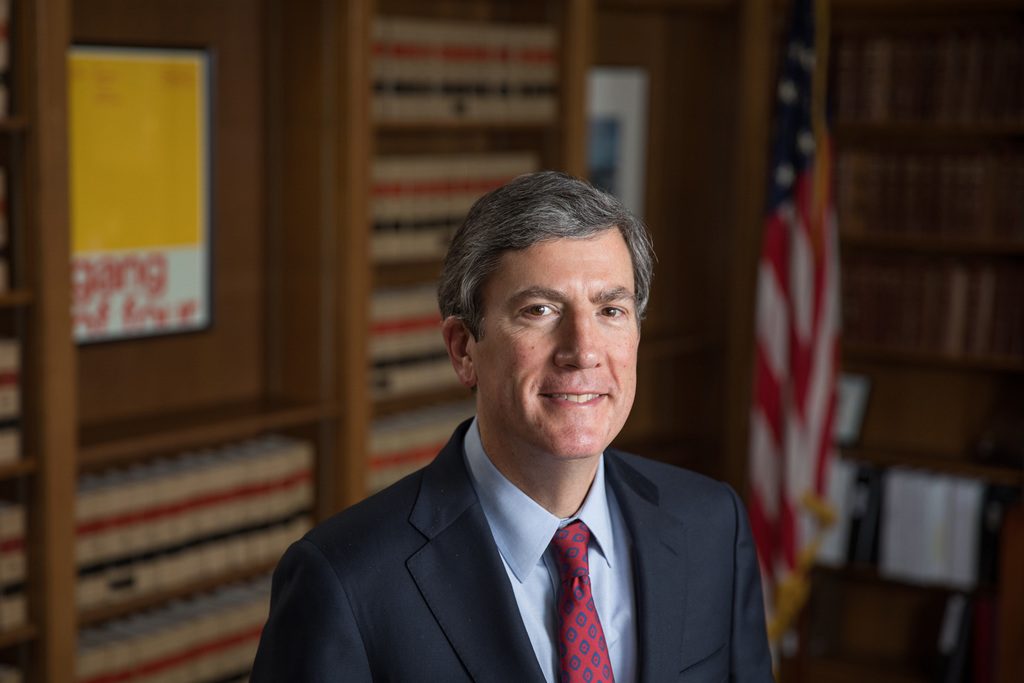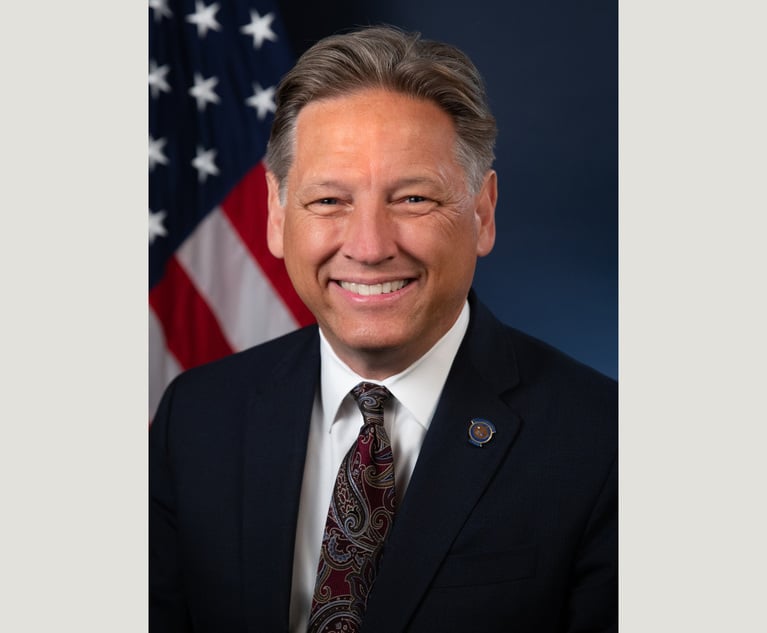Federal Judge Sharply Questions Trump's Shift on Asylum
Judge Jon Tigar pressed the government on the number of migrants would have been "granted asylum under existing law but who would have been denied asylum under the new rule."
November 19, 2018 at 04:37 PM
4 minute read
 Judge Jon Tigar, U.S. District Court for the Northern District of California (Photo: Jason Doiy/ALM)
Judge Jon Tigar, U.S. District Court for the Northern District of California (Photo: Jason Doiy/ALM)
A California federal judge grilled government lawyers Monday over a Trump administration rule barring asylum for migrants who cross the southern border outside of ports of entry, specifically focusing on whether the change will affect asylum-seekers with legitimate cases and if it conflicts with earlier rules set by Congress.
In the hearing, Judge Jon Tigar of the U.S. District Court for the Northern District of California pushed both sides on whether a recent proclamation from President Donald Trump and an interim final rule from acting Attorney General Matthew Whitaker and Department of Homeland Security Secretary Kirstjen Nielsen would impact migrants who would have been “granted asylum under existing law but who would have been denied asylum under the new rule” and whether there is a correlation between weak asylum cases and non-port of entry crossings that justifies the new rule.
Tigar wanted to know how many migrants would have been “granted asylum under existing law but who would have been denied asylum under the new rule” and whether there is a correlation between weak asylum cases and non-port of entry crossings that justifies the new rule.
American Civil Liberties Union lawyer Lee Gelernt, who represented the nonprofit plaintiffs, said that about 6,000 of the asylum cases granted last would not have been granted under the Trump administration's new rule. He said that many migrants with legitimate asylum cases cross the border between ports because they don't know the correct entry spot or are forced to another location by cartels.
Gelernt also argued that the new rules violate the Immigration and Nationality Act set by Congress, which state that asylum-seekers can enter the country outside of ports of entry.
The Trump administration, represented by Department of Justice Civil Division Deputy Assistant Attorney General Scott Stewart, said the new rule does not conflict with Congress' because asylum-seekers can still enter the U.S., if it's done through a designated port.
A similar hearing was also held in district court in Washington, D.C., on Monday.
Tigar pushed back on Stewart's argument, asking how the government “makes a distinction between Congress saying you can apply for asylum, regardless of whether you came in at a port of entry” and the president and attorney general saying, “We can deny asylum on the same ground.”
“If the rule is valid, what's left of that congressional intent?” Tigar asked.
Stewart also argued that the nonprofit groups, East Bay Sanctuary Covenant, Al Otro Lado, Innovation Law Lab and the Central American Resource Center in Los Angeles, who are also represented by the Southern Poverty Law Center and Center for Constitutional Rights, lack standing, as none of them are migrants affected by the new rule.
Stewart said that negative impacts to funding the groups have claimed as injury are speculative, as the suit was filed just hours after Trump's proclamation on Nov. 9.
Gelernt said the plaintiffs have standing and that “organizations are routinely allowed to file these types of lawsuits” because the new rule could force them “to rearrange their entire organization.” Gelernt said he believes they also have third-party standing for unaccompanied children being denied applications for entry at ports of entry in Mexico.
The ACLU lawyer estimated Tigar would make his decision by Monday afternoon. If he grants the TRO, the next step could be a quick preliminary injunction hearing, followed by an appeal by either side to the U.S. Court of Appeals for the Ninth Circuit. Gelernt said his ultimate goal is a permanent injunction against the Trump administration's asylum rule.
This content has been archived. It is available through our partners, LexisNexis® and Bloomberg Law.
To view this content, please continue to their sites.
Not a Lexis Subscriber?
Subscribe Now
Not a Bloomberg Law Subscriber?
Subscribe Now
NOT FOR REPRINT
© 2025 ALM Global, LLC, All Rights Reserved. Request academic re-use from www.copyright.com. All other uses, submit a request to [email protected]. For more information visit Asset & Logo Licensing.
You Might Like
View All
After Solving Problems for Presidents, Ron Klain Now Applying Legal Prowess to Helping Airbnb Overturn NYC Ban
7 minute read
DOJ, 10 State AGs File Amended Antitrust Complaint Against RealPage and Big Landlords
4 minute read
Pentagon Settles Suit Seeking to Clear Records of Service Members Discharged for Being LGBTQ
3 minute readTrending Stories
- 1People in the News—Jan. 10, 2025—Lamb McErlane, Saxton & Stump
- 2How I Made Partner: 'Be Open With Partners About Your Strengths,' Says Ha Jin Lee of Sullivan & Cromwell
- 3Essential Labor Shifts: Navigating Noncompetes, Workplace Politics and the AI Revolution
- 4The Coordinate Jurisdiction Rule on Insurance Bad Faith Litigation
- 5South Carolina Physicians Challenge Abortion Ban Under Religious Freedom Claims
Who Got The Work
Michael G. Bongiorno, Andrew Scott Dulberg and Elizabeth E. Driscoll from Wilmer Cutler Pickering Hale and Dorr have stepped in to represent Symbotic Inc., an A.I.-enabled technology platform that focuses on increasing supply chain efficiency, and other defendants in a pending shareholder derivative lawsuit. The case, filed Oct. 2 in Massachusetts District Court by the Brown Law Firm on behalf of Stephen Austen, accuses certain officers and directors of misleading investors in regard to Symbotic's potential for margin growth by failing to disclose that the company was not equipped to timely deploy its systems or manage expenses through project delays. The case, assigned to U.S. District Judge Nathaniel M. Gorton, is 1:24-cv-12522, Austen v. Cohen et al.
Who Got The Work
Edmund Polubinski and Marie Killmond of Davis Polk & Wardwell have entered appearances for data platform software development company MongoDB and other defendants in a pending shareholder derivative lawsuit. The action, filed Oct. 7 in New York Southern District Court by the Brown Law Firm, accuses the company's directors and/or officers of falsely expressing confidence in the company’s restructuring of its sales incentive plan and downplaying the severity of decreases in its upfront commitments. The case is 1:24-cv-07594, Roy v. Ittycheria et al.
Who Got The Work
Amy O. Bruchs and Kurt F. Ellison of Michael Best & Friedrich have entered appearances for Epic Systems Corp. in a pending employment discrimination lawsuit. The suit was filed Sept. 7 in Wisconsin Western District Court by Levine Eisberner LLC and Siri & Glimstad on behalf of a project manager who claims that he was wrongfully terminated after applying for a religious exemption to the defendant's COVID-19 vaccine mandate. The case, assigned to U.S. Magistrate Judge Anita Marie Boor, is 3:24-cv-00630, Secker, Nathan v. Epic Systems Corporation.
Who Got The Work
David X. Sullivan, Thomas J. Finn and Gregory A. Hall from McCarter & English have entered appearances for Sunrun Installation Services in a pending civil rights lawsuit. The complaint was filed Sept. 4 in Connecticut District Court by attorney Robert M. Berke on behalf of former employee George Edward Steins, who was arrested and charged with employing an unregistered home improvement salesperson. The complaint alleges that had Sunrun informed the Connecticut Department of Consumer Protection that the plaintiff's employment had ended in 2017 and that he no longer held Sunrun's home improvement contractor license, he would not have been hit with charges, which were dismissed in May 2024. The case, assigned to U.S. District Judge Jeffrey A. Meyer, is 3:24-cv-01423, Steins v. Sunrun, Inc. et al.
Who Got The Work
Greenberg Traurig shareholder Joshua L. Raskin has entered an appearance for boohoo.com UK Ltd. in a pending patent infringement lawsuit. The suit, filed Sept. 3 in Texas Eastern District Court by Rozier Hardt McDonough on behalf of Alto Dynamics, asserts five patents related to an online shopping platform. The case, assigned to U.S. District Judge Rodney Gilstrap, is 2:24-cv-00719, Alto Dynamics, LLC v. boohoo.com UK Limited.
Featured Firms
Law Offices of Gary Martin Hays & Associates, P.C.
(470) 294-1674
Law Offices of Mark E. Salomone
(857) 444-6468
Smith & Hassler
(713) 739-1250







